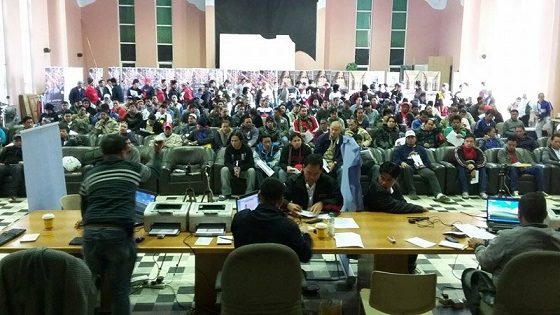
Despite decline in global oil prices, the Saudi labor market remains stable for Filipino workers. The reported retrenchments are not due to the oil price slump in recent months, according to assessment of Saudi-based labor attaches and diplomats of the situation in the Middle East kingdom that hosts some 800,000 OFWS.
The positive assessment should calm the fears of massive retrenchment in Saudi due to the plunge of oil prices. In fact, last week Labor Secretary Rosalinda Baldoz expressed concerns of a possible displacement some 1.5 million Filipinos classified as temporary workers in the Middle East as the global oil glut is expected to continue in the coming months with the recent lifting of the sanctions on oil-producer Iran.
A report on the OFW situation in Saudi said, the retrenchments, particularly to the employees of the Middle East construction giant Saudi Binladen Group (SBG), “are hardly traceable to declining oil prices.”
The suspension of SBG projects was due to the sanction imposed by the King on the construction company after a giant crane crashed at the Grand Mosque in Makkah September last year killing more than a 100 people and injuring more than 400.
The 200,000 strong SBG was forced to lay off 15,000 of their employees, many of them Filipinos.
Analysts said there’s also the Saudization, a policy of the Kingdom which started in 2011 of pushing for more Saudi nationals in private jobs, making it more difficult and expensive for companies to hire foreign workers.
Media reports said due to reduced oil income caused by the global oil glut, the Saudi government has scrapped some of its non-essential infrastructure projects like soccer stadiums. However, plans for construction of housing, hospitals and schools are not affected, reports said.
Aside from retrenchment, there are reports of delayed payments to employees. A report by Al Hayat newspaper said finance ministry has cut payments to firms doing state construction work to five percent of contract from 20 percent.
Despite these developments, labor attaches said there is no drop in job offers for Filipinos. For January alone the Philippine Overseas Labor Office in Saudi received 6,527 offers, a three-year record high. In January 2015, the POLO office got 4,309 offers and in 2014, only 3,922.
Quoting Saudi businessmen, the attaches said the retrenchments are “moderate” and “mere temporary employment slowdown in the construction sector.”

The attaches said the Kingdom’s economists are “confident in effectively managing the effects of the ‘oil price crash’ which other analysts simply regard as the ‘oil cycle.’ Saudi economic experts continue to express optimism on sound fundamentals of Saudi economy – foreign asset reserves estimated at no less than USD650 billion as of October 2015; investor confidence, available credit facilities and growing non-oil industries.”
The Kingdom has announced that it will increase production following the decision of the Organization of Petroleum Exporting Countries not to reduce oil supply in the world market to preserve their share.
With this strategy, Saudi will continue needing highly skilled and trained manpower in the oil and gas sector. “The displacement of Filipinos from the oil and gas sector is not expected, at the very least in the near future,” the Philippine government’s labor attaches said.
They concluded: “Development planning in the Kingdom has observedly matured to unprecedented levels. The wisdom of the now- highly educated Saudi economic planners, aided by the best consultants, could be expected to tap the country’s enormous assets to pump-prime Saudi’s non-oil private sector industries. And while the recognized ‘disconnect between the private sector needs and the education/training outcomes’ prevails, the Saudi labor market for Filipinos and other migrant workforce is expected to remain bullish.”
The still-positive current situation in Saudi should give the government time to implement programs that would provide Filipinos jobs in their own country so they can work without being separated from their families. That’s what it should be.
“Analysts said there’s also the Saudization, a policy of the Kingdom which started in 2011 of pushing for more Saudi nationals in private jobs, making it more difficult and expensive for companies to hire foreign workers.”
This I believe is the primary reason as told me by friends and relatives working over in SA.
I would like to hear from presidential aspirants their respective doable programs to create jobs in the country in any eventualities that foreign countries will shut doors to foreign workers for some reasons. And that pinoys will have a choice to work or not to work in foreign lands.
I could only wish the excessive optimism of the labor attaches are founded on concrete solid grounds and not on a desert sand.
What say’s Magno? his input bears weight, the gentleman being on the ground himself.
Meantime, I hope it’s not too much to expect labor and trade departments to have concluded laying-out foundations in probing Iran’s labor and consumer agricultural markets–as a fallback measure, in short term with a strategic thinking of building serious trade engagements with the Middle East eco-political heavyweight.
Going back to the thread’s original issue, gut feel tells me that our labor attaches, overworked hard worker they may be should downsize their confidence. The Guardian, among others have reported that Saudi’s ARAMCO, the world’s largest oil company, is on the process of going public.
An open publicly listed company is generally not known to be generous to its workers in terms of employment security—in fact, often the opposite, they are known icons for massive workers retrenchments at a stroke of a pen without prior consultations.
Even Alberta who has diversified economy and not only dependent on oil is now reeling at the effect of low cost of oil in the market. Many foreign contract workers were sent home and oil patch worker just mailing their house keys to the bank in what is called “jingle mail” to get out of their mortgages for losing their high paying jobs in the oil industries and start going back to school for retraining..
But even with plenty of safety nets for oil patch workers like separation pays, Unemployment Insurance, he pay cut is quite considerable and will greatly affect their lifestyle. And maybe Alberta will soon start thinking “eVat” like all other Provinces which the province not done since the Royalty on oil more than enough to compensate on Goods and Services Tax..(Ontario impose 8 % on goods and services tax.)
Alberta lost 64000 during the first 8 months of 2015 due to the oil crisis and will continue to loss job as the crisis continues..no oil producing country is exempt. And Alberta also has sovereign reserve during the Good Time.
No angle to pinpoint blame on PNoy, Mar, and the Liberal Party?
Kulang ang istorya pag walang upak sa tatlong yan, di ba po?
Nakakapanibago.
no need to blame the two inutile and their Libog Party. they have nothing to do with the feared mass lay offs of OFWs here in saudi arabia. wala din silang mailalatag na solusyon kundi PANGAKO, pangako, PANGAKO pa din. at higit sa lahat PANGAKO. wala silang silbi kapag ang nakataya ay ang kapakanan ng mga OFWs which proved that in the six years of this administration’s governing the country NOTHING had been done to anticipate any eventualities concerning overseas workers particularly kung sakaling umuwi na at permanenteng mamalagi sa bansa.
huwag na silang idawit pa. baka sumikat.
tama ang nabanggit na rason kung bakit ang Saudi Binladin Group na isa sa pinakamalalaking kumpanya dito sa middle east ay nagbabawas ng kanilang empleyado na kinabibilangan ng libo libong pinoy – dahil yun sa bumagsak na giant tower crane sa Grand Mosque Makkah project. isa yun. ang pangalawang dahilan ay ang pagpapalit ng hari kung saan meron siyang sariling contractor na pinapaboran na binigyang dahilan din ng naganap na sakunang kinasangkutan ng nabanggit na kumpanya. another factor ay ang saudization program ng MoL na nagbibigay pagkakataon sa mga unemployed saudi professionals and skilled labor na makapagtrabaho sa private sectors, hindi lamang sa construction.
kung qualified ang isang OFW sa kanyang pinirmahang kontrata at kailangang kailangan sa kumpanya, may dahilan ba upang siya ay i-terminate. mas tamang nagkakaroon at nagpapatupad ang MoL ng reassessment of skills and proficiency para sa mga expatriate workers, both professionals and laborers.
“…………kung qualified ang isang OFW sa kanyang pinirmahang kontrata at kailangang kailangan sa kumpanya, may dahilan ba upang siya ay i-terminate? mas tamang sabihing nagkakaroon at nagpapatupad ang MoL ng reassessment of skills and proficiency para sa mga expatriate workers, both professionals and laborers.”
I also heard that Qatar, home to the third largest group of OFWs at a quarter of a million, is about to layoff workers not due to the oil problem but due to a recent law that will require expats in the higher rungs of the corporate ladder a minimum basic education of at least 12 years, aside from their bachelors’ degrees of course. This will affect mostly white-collar workers like engineers, architects, nurses, teachers, etc.
I hope gov’t is prepared to influence the Qatar gov’t into accepting work experience as equivalent in lieu of 2 years deficiency in education.
it is time for the government to admit that dependence of middle eastern countries on foreign work force to cultivate their economic fields is coming to a stop because they are now realizing that subsidies to their locals are draining their resources while contributing nothing to their growth and the that best assistance they could provide to their citizens is by giving them job for self sustenance.
if one can notice, after martial law when OFWs began migrating temporarily en masse to countries offering employment and better opportunities, the government on its part began distancing itself in providing social services to its people. one after the other, government assets and institutions were sold and privatized, part of the proceeds were used they say in debt servicing. but, where did most of the money go? did they ever think of these events that we OFWs will not be needed anymore in countries of our employment? what’s waiting for us at home?
past administrations and the outgoing one always claim the economy is picking up BUT the big question is – WHY ARE STILL PRICES OF COMMODITIES CONTINUE TO SOAR? who are really benefitting from this growth? the already rich politicians who guised themselves as public servants but their being in the elective positions are only for protection of self interest to include that of their businessmen patrons?